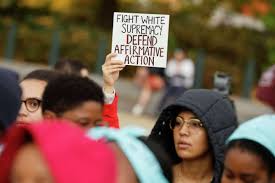NWSA’s Statement on the 6/29 SCOTUS Decision
Ignoring Race Will Not End Racism

The National Women’s Studies Association, the nation’s largest network of feminist scholars,
educators, and activists, vehemently opposes the Supreme Court’s decision in the Students For
Admission v. Harvard College and the Students For Admission v. University of North
Carolina cases. Justice Ketanji Brown Jackson wrote in her dissent to the Students For
Admission v. Harvard College case that this country has never been colorblind. We would add
that it has also never been race-neutral, nor has it ever been equal. America rests on a foundation
of race and racism. Enslaved people were forced to build this country, and the status quo has
been maintained by the descendants of those who enslaved people. In 2008, with the election of
President Barack Obama, many of us braced ourselves for what we knew was going to come. We
knew then that a gear had shifted somewhere in the white supremacist mechanism and that their
slow walk back to power would result in a universal gutting of equity-based policies, plans, and
initiatives. Some of us tried to sound the alarm, but it was hard for many to believe that the
country was on fire when it felt like we had won. And then Black Lives Matter. And then Donald
Trump. And then Gorsuch, Kavanaugh, and Coney Barrett. And then George Floyd. And then
Ron DeSantis. And then the attacks on critical race theory, Black History, and the LGBTQ
communities. And then the Dobbs decision. And now affirmative action.
Today’s Supreme Court decision to strike down race-conscious admissions as a violation
of the Equal Protection Clause of the 14th Amendment was not unexpected nor was it surprising. We knew that it was coming.[1] In fact, Justice Clarence Thomas had long said that even though he benefitted from affirmative action, he disagreed with it and wanted to strike it down.[2] He just never had the votes, until now. It is important to note that the SCOTUS Supermajority
(Justices Roberts, Thomas, Gorsuch, Kavanaugh, Coney Barrett, and Alito) not only watered
down the historic Brown v. Board decision but they also intentionally narrowed their decision to
only focus on race, allowing preferential treatment based on one’s status as a legacy; an athlete;
or a child of either a donor, faculty member, or staff to remain in place. Thus, affirmative action
for the SCOTUS Supermajority only matters in discussions about race, and for them, the only
way to end race-based policies is to remove race from consideration. Justice Brown Jackson
notes that this type of thinking is in vain because “if the colleges of this country are required to
ignore a thing that matters, it will not just go away. It will take longer for racism to leave us.
And, ultimately, ignoring race just makes it matter more.”[3] Additionally, studies have shown
that the percentage points given to a Black, Brown, or Indigenous applicant are considerably
lower than the percentage points given to legacies (in some selective schools, being a legacy
raises an applicant’s chances of being accepted by almost 20 percentage points).[4]
So, one wonders why race is the determining factor that the SCOTUS Supermajority chose
to focus on. According to Justice Sonia Sotomayor, today’s decision is “not grounded in law or
fact and contravenes the vision of equality embodied in the Fourteenth Amendment.”[5] And yet,six Justices have succeeded in turning back the clock on equity and equality, a decision that will
be felt for years to come. They did it because they are not colorblind. They are not race-neutral.
And they did it simply because they could.
As Shirley Chisholm once said, “You don’t make progress by standing on the sidelines,
whimpering and complaining. You make progress by implementing ideas.” This is why we
organize. We cannot get tired or be weary or give up. We cannot stop pushing.[6] We must
work locally and nationally. We must continue to push President Biden and all of our elected
officials to do everything that they can to right this wrong. We must keep our eyes fixed on
where we want to go and not be stopped by what we see now. The SCOTUS Supermajority
thinks that the battle is over because they have spoken; we know that the battle will not end until
we have the last word. As always, we stand ready to fight with you and, if needed, fight for you.
Bending toward social justice,
Karsonya Wise Whitehead, NWSA President
Ariella Rotramel, NWSA Vice President
Erica Williams, NWSA Secretary
Dominique Hill, NWSA Member-at-Large
Gina Velasco, NWSA Member-at-Large
Yi-Chun Tricia Lin 林怡君, NWSA Past President
Beverly Guy Sheftall, NWSA Past President
ENDNOTES
[1] The Supreme Court cases that challenged affirmative action began in 1978 with the Regents of the University of California v. Bakke and continued with Hopwood v. Texas in 1996, and Grutter v. Bollinger and Gratz v. Bollinger in 2003.
[2] Justice Brown Jackson in responding to Justice Thomas’s concurring opinion in the decision, wrote that he is obsessed with race-consciousness in such a way that it “far outstrips my or UNC’s holistic understanding that race can be a factor that affects applicants’ unique life experiences.” 600 U.S. (2023), Jackson, J., Footnote 102.
[3] 600 U.S. (2023), Jackson, J., dissenting for the case No. 21-707.
[4] Golden, Daniel (2010). An Analytic Survey of Legacy Preferences. In Kahlenberg, Richard D. (ed.). Affirmative-Action for the Rich: Legacy Preferences in College Admissions. New York: The Century Foundation Press.
[5] 600 U.S. (2023), Sotomayor, J., dissenting for cases Nos. 20–1199 and 21-707.
[6] At the same time, we want to remind you again of the need for radical preventative self-care. In other words, take care of yourself now by choice before you have to do it by circumstance.